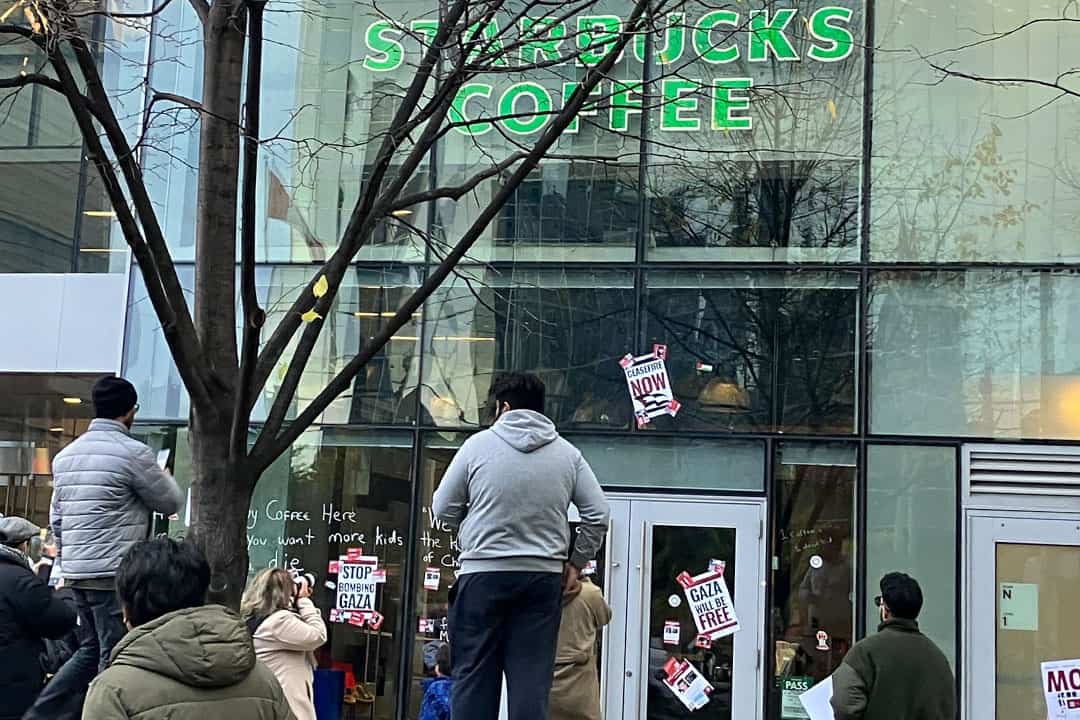Content warning: This article contains descriptions of the ongoing violence in Gaza.
Lately, as I have walked past the Starbucks locations at UTM, I have noticed the odd emptiness inside these cafés. Where students used to make lines from the cash registers up to the entrance for the sake of a hot americano or an iced chai latte, there is now a pathetic trickle of customers. The sight of a nearly-empty Starbucks at a university campus on a busy Thursday afternoon is jarring, even unmooring.
In a number of countries in the Middle East, there has been a similar spectacle. On any evening, McDonald’s employees in Egypt, Jordan, Kuwait, and Morocco might be seen cleaning tables inside empty restaurants during business hours.
After the Hamas attack on Israel on October 7 and the Israeli military’s violent retaliation in the Gaza strip soon after, Starbucks sued its workers’ union, Starbucks Workers United, over posts in support of Palestine’s liberation that included the company’s logo. It accused the workers’ union of ‘harming its reputation’. McDonald’s Israel also announced on its social media that it was giving out free meals to the Israel Defense Forces personnel, and to “all those who were involved in the defense of the state, hospitals, and surrounding areas.”
In early November, the popular Palestinian-led Boycott, Divestment, Sanctions movement’s published a list detailing “companies that were profiting from the genocide of the Palestinian people.” In the context of mass protests for Palestinian liberation, social media campaigns to boycott these companies generated traction. There were calls to boycott the Walt Disney Company after its donations to Israel; to boycott PUMA for sponsoring Israel’s football association and governing teams in illegal settlements on occupied Palestinian land; and to boycott Google and Amazon for supporting Israel with artificial intelligence and other computing technologies in a $1.22 billion contract.
The air was thick with righteous rage. Finally, I felt like change was stirring. Change that grew out of a collective choice — a force with a root. If, as common people, we are powerless against the forces that are waging war in Gaza, I believe we can at least put our money where our morals are and participate in the boycott. If enough people do not walk into Starbucks or pay for a Big Mac, the public pressure on companies may lead to them withdrawing their support for Israel, and there could even someday be no more bombs to drop in Gaza. No more churches or hospitals obliterated; no more bodies burst open in the street; and no more children forced to livestream their tragedies, gazing at us through innocent eyes that have lost the glimmer of youth and now look very, very old.
Sometimes in boycotts, people know what’s going on, and they care, but still choose to support these corporations. A friend of mine insists on her daily Starbucks order because she sees boycotting as largely hypocritical — so much of our consumption is already sourced through the blood of innocents, and she would rather not be a hypocrite. The iPhone on which I share my support for Palestine is primarily extracted in Congo — the country bordering my father’s village — through guerilla warfare, child labour, and terror.
So many places, like Congo, deserve our attention and action and get so little. Boycotting is selective and morally gray, and can get exhausting. That means that our boycotting practice must be specific, focusing on one cause at a time — and since the cultural conversation has centered on Palestine, we must focus there first.
We know from past experience that boycotting works. The Montgomery Bus Boycott from 1955 to 1956 was the first large-scale act of protest against racial segregation in the US. After Rosa Parks was arrested, the US Supreme Court ordered Montgomery to integrate its bus system and this boycott launched the political career of pastor Martin Luther King Jr.
Boycotting works — but, like a spell of magic, it is complex, and can be both good and evil depending on the cause. We recently witnessed the Bud Light Boycott. After Bud Light partnered with transgender influencer Dylan Mulvaney to promote their beer, conservatives organized a boycott which cost the company 23 per cent of their sales and their spot as the top-selling beer in America.
In the end, all it takes is time, energy, and talk. It matters that we keep reminding ourselves about what we are fighting for. Already, McDonald’s Egypt has seen a 70 per cent drop in sales in October and November. Turkey’s government removed CocaCola and Nestlé products from all restaurants on the parliament campus following a public outcry against the brands. McDonald’s Corporation issued a statement expressing dismay at disinformation on their position on the conflict, while its Egyptian branch has pledged $650,000 in aid to Gaza and its franchises across but not limited to Saudi Arabia, Jordan, Turkey, and the United Arab Emirates have pledged more than $3 million in support of Palestinians in Gaza.
I believe it is important that in the consumer-capitalist machine, where algorithms and advertisements may glean our passions and desires and tempt us with rewards, we do not give in to “boycott fatigue” only weeks after the first bomb was dropped in Gaza.
Boycotting demands sacrifice, and in a world full of pain, are we ready to surrender everything for the sake of freedom? I like my iPhone, but I care more about the people in Congo that died to make it. So, I shall use my iPhone to talk about Congo when no one else is. It is not a perfect method — but it means I am trying.
Divine Angubua is a third-year student at UTM studying history, political science, and creative writing. He is the editor-in-chief of With Caffeine and Careful Thought and a staff writer at The Medium. He is the associate comment editor of The Varsity.



No comments to display.